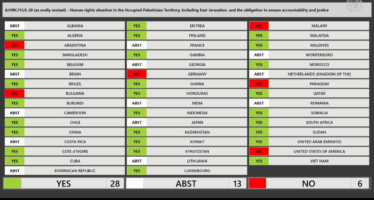Mahmoud Abbas: Negotiating Palestinian State Away
![]()
Palestinian counterpart Mahmoud Abbas attended a meeting at the Elysee presidential palace in Paris on 8 June 2012
There had been no indications that the Palestinian Authority (PA) intends to forfeit its bid for statehood at the UN. But signs of this suddenly emerged during Mahmoud Abbas’s visit to Paris, where he announced the end of ‘the dream.’
The occasion: The visit of Palestinian President Mahmoud Abbas to France to meet the new French President Francois Hollande.
The purpose: To persuade Paris to support Palestinian efforts to return to the United Nations to secure recognition of full Palestinian statehood at the General Assembly meeting in September.
The outcome: France succeeds in persuading the Palestinian president to accept non-member state status at the United Nations.
The above can be considered the summary of the progress made by the Palestinian cause on the negotiating track since shortly before the failed attempt by the Abbas to secure recognition of Palestinian statehood at the UN during last September’s General Assembly meeting.
Back then, the Palestinian bid was met with an American threat to wield the US veto power, before ultimately failing to secure the necessary nine votes at the Security Council, leading to the outcome we have seen with Abbas at present.
After the failure of the Palestinian leadership to persuade nine members of the Security Council to vote in favor of statehood, including several European countries, the former French President Nicolas Sarkozy took to the rostrum at the UN to launch his initiative.
He proposed that the UN accept Palestine as a non-member state, in return for a one-year road map for peace negotiations, during which the Palestinians and Israelis would reach a deal on borders and security, and which would then culminate with the declaration of the Palestinian state.
Also, the Palestinian leadership had rejected the proposal regarding the status of a non-member state, while agreeing to enter into preliminary negotiations, dubbed the exploratory talks, for three months with the Israeli side, but which in the end achieved nothing.
The two sides, despite all the papers and visions that were presented, failed to move to the next step. Consequently, the Palestinian side is once again threatening to go to the UN to seek recognition, in the hope that this time the Palestinians will be able to secure the nine required votes and embarrass the United States by pushing it into wielding the veto.
However, this new bid has been nipped in the bud, with the Palestinian side once again mulling the incomplete ‘state’ that they had rejected only a year ago.
This was declared explicitly by President Mahmoud Abbas. Speaking at a news conference with French President Francois Hollande, Abbas said, “We will go to the General Assembly because we went to the UN Security Council and unfortunately we did not get the votes needed.”
“If we don’t return to the negotiations, we’ll of course go to the General Assembly to obtain the status of non-member state, as is the case for the Vatican or Switzerland,” he added. He then concluded, “Of course, we are going to encounter many obstacles”.
Abbas made these statements despite the fact that the proposal concerning non-member status was previously considered the equivalent of an insult.
He did not stop at this, and went further by easing the conditions for negotiations or dialogue with the Israeli authorities, as Abbas seems to have distinguished between the two concepts, without clarifying the differences.
After he stated that “the cessation of settlement construction is not a precondition for returning to the negotiating table, but an obligation that is mentioned in more than one international document and agreement,” he went on to say that “if Netanyahu agrees to release prisoners and allows us to import weapons for the police, we will launch dialogue. This does not mean that we would negotiate.”
But what is the difference between dialogue and negotiations? This is a question that was left unanswered by Abu Mazen, who, as it turns out, continues to have open lines of communication with the Israeli government though the PLO Executive Committee member Saeb Erekat and Yitzhak Molcho, advisor to the Israeli prime minister.
The existence of this channel confirms that Abu Mazen’s strategic choice is based on negotiations and nothing else.
Abbas is not afraid to declare this publicly, while all his maneuvers suggest that his ultimate goal is to return to the negotiating table.
Little by little, the Palestinian president eases his demands under the table, in preparation to jump back once again onto the negotiating game, of which he never tires.
Regardless of Abbas’s maneuvers, there is one obvious conclusion here, namely that the “dream of statehood” has been shattered, a dream that the PA touted to the Palestinian people throughout last year, both before heading to the UN and afterwards, until Abu Mazen declared its end, and settled for the bare minimum.
This article is an edited translation from the Arabic Edition.
Related Articles
Gaza/Israel: conclusión de las audiencias en demanda de Nicaragua contra Alemania
![]()
El pasado 9 de abril, la Corte Internacional de Justicia (CIJ) anunció el final de las audiencias entre Nicaragua y Alemania, con respecto a la solicitud urgente de medidas provisionales
Entrevista con Leila Khaled, guerrillera palestina
![]()
“Mi primer novio fue el Kalashnikov” (incluye vídeo)Carlos de Urabá Rebelión Tuvimos la oportunidad de conversar con la mítica guerrillera palestina
Fatah: PA to seek full recognition at UN
![]()
Palestinian Authority will ask Security Council for full recognition next week, Fatah official Mohammed Shtayyeh says Abbas will file the



